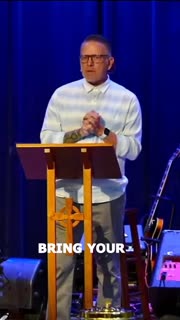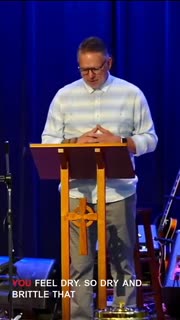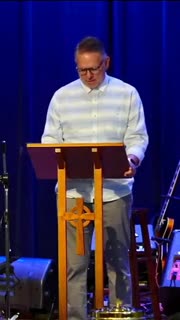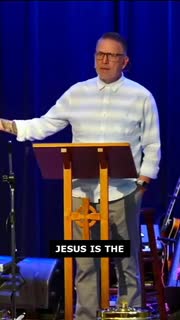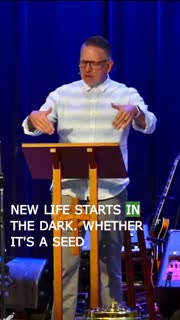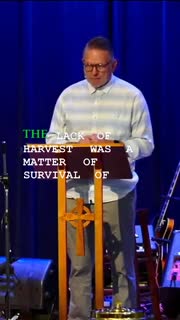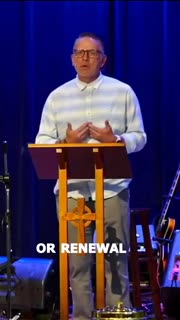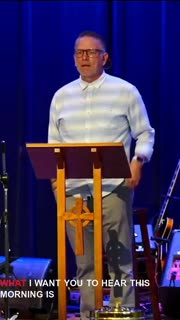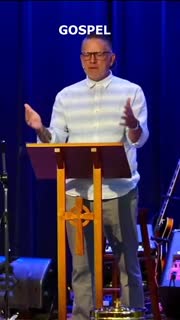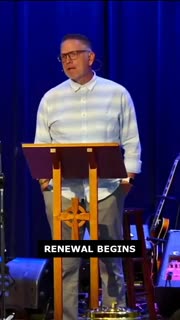Transforming Brokenness: Finding Renewal in Christ
Devotional
Sermon Summary
Bible Study Guide
Sermon Clips
### Quotes for Outreach
1. "Bring your poisonous gourds and your death-filled pots to the Lord of renewal. Now maybe you've been doing Jesus, but you've only tasted semi-rancid stew. Bring it to the Lord. Maybe you love it. Maybe you look around and all you feel right now in your life is the sting of death. Bring it to the Lord. You feel empty. Bring it to the Lord. You feel void and you look into the void of your life. You're obsessed about it. Bring it to the Lord." [59:45] (40 seconds)
2. "You feel dry. So dry and brittle that anything that might touch you might crack you. Bring it to the Lord. You taste the poison of your past. Redeemer, bring it to the Lord. You are bitter. Bring it to the Lord. That bitter root has unleashed a harvest of bitterness. Bring that harvest to the Lord. You're tired, so tired. Your life is an exercise of tail wagging the dog. Bring it to the Lord. You're hungry. Oh, so hungry for something, anything that might save you or inspire you or renew you. Bring that grumbling belly to the Lord." [01:00:23] (46 seconds)
3. "If you bring all of those things to the Lord, Redeemer, you will discover that once the Lord touches, you will discover that once the Lord touches, you a little flower on it. There's no more harm in that pot. I don't know if you've heard this expression, the enemy of my enemy is my friend. Like even the things that filled your death-filled pots, when that whole pot is given to Jesus, they don't have the same taste of death anymore, right? I mean, there's freedom and renewal and restoration." [01:01:11] (37 seconds)
4. "Jesus is the better Elijah who invited us to drink from a never-ending fountain of his living spirit and feast on the nourishment of his body, the living bread. Jesus is the Lord of the feast. He's the Lord of the harvest. He's the Lord of the renewal. He is the first fruit of what God intends to do in the world, namely bring life to potteries. Full of death and half-filled bags of false self and not enoughness." [01:14:36] (28 seconds)
5. "New life starts in the dark. Whether it's a seed in the ground or a seed in the ground, whether it's a seed in the ground, a baby in the womb or Jesus in the tomb, it starts in the dark. And we are to bring our pots, our bodies, our first fruits, our whole selves, and consecrate it to the Lord of the renewal. It's when these things are brought to Elijah, renewal comes. We are to give ourselves to the Lord." [01:15:48] (24 seconds)
### Quotes for Members
1. "The lack of harvest was a matter of survival of life and death. And in the ancient world and still parts of our world, in some marginal economies, providing for daily bread would take up most of the space that you have in your mind. It would take up most of your income. It consumes your thoughts. Now the question before us this morning, Redeemer, is what do we do? What do we do? What do we do? What do we do? What do we do? How many of you have had your thoughts consumed this week about having enough? Having enough money? Food? Maybe not stock for us here at Redeemer. Maybe for some. What about your needs? Your energy? Just life? What's consuming your thoughts this morning, Redeemer?" [52:31] (58 seconds)
2. "What do you do for sustenance or renewal when all there is is death in the pot? If someone doesn't point out to us that there's death in that pot, we would happily go on guzzling it into our guts, unaware of the poisonous results. Death in the pot, we need to pour it out. We need to start over. Like if you've ever mixed up a cake recipe adding salt instead of sugar, there is no fixing that. So the man of God cries out to Elisha, there's death in the pot. He knows that the man of God can renew this and consequently renew them." [57:06] (54 seconds)
3. "What I want you to hear this morning is your enoughness comes from the Lord. He's the only one who can take what we've stuffed into that bag and produce life from it. Like, remember, these are the things that we don't want people to see. See, and I'll tell you from experience of when you start to give this to the Lord and peer and take these things out of the bag, they become this thing that connects you to another person and brings life to them. Like our stories become this place by which we minister to other people in their stories. That's the beauty and wonder of the gospel." [01:12:42] (52 seconds)
4. "The gospel transforms us. God deals with our true self alone, not the false one. He calls us to get rid of this false way of being in the world, to be true before him and others. That's called repentance, by the way. And then he brings life. And that life actually comes before. It actually is the thing that produces that repentance. So the second application, bring your half-filled bags or stuffed full bags that you've been dragging through your life. Bring all of yourself to the Lord." [01:13:30] (42 seconds)
5. "Renewal begins in this unimpressive place where there's famine in the land, where there's vines of poisonous gourds, where there's death in the pot and only 20 loaves, some head of grain, and a long black bag full of our half-broken stories. Turn to Jesus. New life starts in the dark. Whether it's a seed in the ground or a seed in the ground, whether it's a seed in the ground, a baby in the womb or Jesus in the tomb, it starts in the dark. And we are to bring our pots, our bodies, our first fruits, our whole selves, and consecrate it to the Lord of the renewal." [01:15:48] (33 seconds)
Ask a question about this sermon
1. "Bring your poisonous gourds and your death-filled pots to the Lord of renewal. Now maybe you've been doing Jesus, but you've only tasted semi-rancid stew. Bring it to the Lord. Maybe you love it. Maybe you look around and all you feel right now in your life is the sting of death. Bring it to the Lord. You feel empty. Bring it to the Lord. You feel void and you look into the void of your life. You're obsessed about it. Bring it to the Lord." [59:45] (40 seconds)
2. "You feel dry. So dry and brittle that anything that might touch you might crack you. Bring it to the Lord. You taste the poison of your past. Redeemer, bring it to the Lord. You are bitter. Bring it to the Lord. That bitter root has unleashed a harvest of bitterness. Bring that harvest to the Lord. You're tired, so tired. Your life is an exercise of tail wagging the dog. Bring it to the Lord. You're hungry. Oh, so hungry for something, anything that might save you or inspire you or renew you. Bring that grumbling belly to the Lord." [01:00:23] (46 seconds)
3. "If you bring all of those things to the Lord, Redeemer, you will discover that once the Lord touches, you will discover that once the Lord touches, you a little flower on it. There's no more harm in that pot. I don't know if you've heard this expression, the enemy of my enemy is my friend. Like even the things that filled your death-filled pots, when that whole pot is given to Jesus, they don't have the same taste of death anymore, right? I mean, there's freedom and renewal and restoration." [01:01:11] (37 seconds)
4. "Jesus is the better Elijah who invited us to drink from a never-ending fountain of his living spirit and feast on the nourishment of his body, the living bread. Jesus is the Lord of the feast. He's the Lord of the harvest. He's the Lord of the renewal. He is the first fruit of what God intends to do in the world, namely bring life to potteries. Full of death and half-filled bags of false self and not enoughness." [01:14:36] (28 seconds)
5. "New life starts in the dark. Whether it's a seed in the ground or a seed in the ground, whether it's a seed in the ground, a baby in the womb or Jesus in the tomb, it starts in the dark. And we are to bring our pots, our bodies, our first fruits, our whole selves, and consecrate it to the Lord of the renewal. It's when these things are brought to Elijah, renewal comes. We are to give ourselves to the Lord." [01:15:48] (24 seconds)
### Quotes for Members
1. "The lack of harvest was a matter of survival of life and death. And in the ancient world and still parts of our world, in some marginal economies, providing for daily bread would take up most of the space that you have in your mind. It would take up most of your income. It consumes your thoughts. Now the question before us this morning, Redeemer, is what do we do? What do we do? What do we do? What do we do? What do we do? How many of you have had your thoughts consumed this week about having enough? Having enough money? Food? Maybe not stock for us here at Redeemer. Maybe for some. What about your needs? Your energy? Just life? What's consuming your thoughts this morning, Redeemer?" [52:31] (58 seconds)
2. "What do you do for sustenance or renewal when all there is is death in the pot? If someone doesn't point out to us that there's death in that pot, we would happily go on guzzling it into our guts, unaware of the poisonous results. Death in the pot, we need to pour it out. We need to start over. Like if you've ever mixed up a cake recipe adding salt instead of sugar, there is no fixing that. So the man of God cries out to Elisha, there's death in the pot. He knows that the man of God can renew this and consequently renew them." [57:06] (54 seconds)
3. "What I want you to hear this morning is your enoughness comes from the Lord. He's the only one who can take what we've stuffed into that bag and produce life from it. Like, remember, these are the things that we don't want people to see. See, and I'll tell you from experience of when you start to give this to the Lord and peer and take these things out of the bag, they become this thing that connects you to another person and brings life to them. Like our stories become this place by which we minister to other people in their stories. That's the beauty and wonder of the gospel." [01:12:42] (52 seconds)
4. "The gospel transforms us. God deals with our true self alone, not the false one. He calls us to get rid of this false way of being in the world, to be true before him and others. That's called repentance, by the way. And then he brings life. And that life actually comes before. It actually is the thing that produces that repentance. So the second application, bring your half-filled bags or stuffed full bags that you've been dragging through your life. Bring all of yourself to the Lord." [01:13:30] (42 seconds)
5. "Renewal begins in this unimpressive place where there's famine in the land, where there's vines of poisonous gourds, where there's death in the pot and only 20 loaves, some head of grain, and a long black bag full of our half-broken stories. Turn to Jesus. New life starts in the dark. Whether it's a seed in the ground or a seed in the ground, whether it's a seed in the ground, a baby in the womb or Jesus in the tomb, it starts in the dark. And we are to bring our pots, our bodies, our first fruits, our whole selves, and consecrate it to the Lord of the renewal." [01:15:48] (33 seconds)
